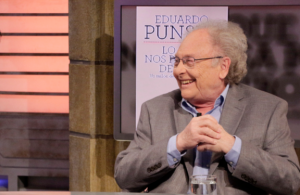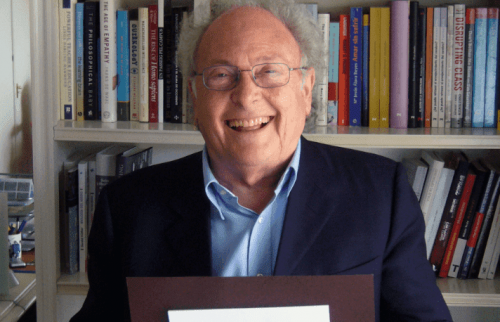Eduard Punset: A Charismatic Scientific Advisor

Eduard Punset is controversial, charismatic, and innovative. He’s a writer, economist, politician, and science populizer. Thanks to his show Redes, which was on the air for almost two decades, millions of Spaniards became interested in science.
He made it possible for science to reach Spanish homes. A great part of the population considers science a strange, incomprehensible, and boring object of study. However, it slowly but surely became entertaining and enjoyable for many thanks to him.
Punset takes advantage of the public’s curiosity. He simplifies what seems difficult and turns it attractive. Although it may seem that everyone likes that, he actually is criticized because of it. In addition, many people tend to believe Eduard Punset is a scientist, although he isn’t.
Eduard Punset has done things many people don’t do. He has very strong political convictions. He’s always opted for new technologies and the most controversial scientific theories. Not only that, but he’s always made sure people are well-informed of them. Undoubtedly, he’s an incredible teacher.

His life
Eduard Punset was born in Barcelona in 1936. He was the son of a Tarragona rural doctor. From a very young age, he showed great interest in studying and learning about different things. He was very keen to learn about the world in general and making discoveries.
Eduard Punset traveled to Los Angeles in the ’60s and was enrolled in the North Hollywood High School, where he learned English. When he returned to Spain, he got a degree in Law from the Universidad Complutense de Madrid. After that, he became involved with the Communist Party, still under the dictatorial regime.
During this era, he met Jorge Semprún, someone he deeply agreed with. As a result of the problems that the dictatorship unleashed, Punset decided to go into exile and continue his studies abroad. His bilingualism allowed him to pursue postgraduate studies in Economics in London, England. He also traveled to France, where he graduated from the École pratique des hautes études.
Eduard Punset and politics
Shortly after finishing his studies, Eduard Punset started working as an economic writer for the BBC. He was the economics director of the Latin American edition of The Economist. Also, he worked as an economist of the International Monetary Fund in the United States and Haiti. After Franco’s death, Eduard Punset returned to Spain and committed 100% to politics.
He was appointed the Minister of Finance by the Government of Catalonia. In the ’80s, he carried out the great work of opening Spain up to the world while serving as Minister of Relations with the European Communities. He took part in the Convergence and Union alliance, but quit after a few months.
During the time he remained in the European Parliament, he took part in the process of economic transformation of Eastern European countries after the fall of the Berlin Wall. After other several attempts at politics, he finally decided to retire in 1995.

His work as a scientific advisor
During the next stage of his life, Punset dedicated himself to working on impactful topics and new technologies. He was an Advising Professor of International Marketing at ESADE. Additionally, he was president of the Instituto Tecnológico Bull, and Professor of Innovation and Technology at the IE Business School. He also worked as a consultant in important sectors and companies and wrote several books on economics and social analysis.
The creation of Redes, a scientific TV show, in 1996, was an important milestone in his already brilliant professional career. The show was on the air for 18 years. During that time, Eduard Punset interviewed great personalities from the scientific and technological in a total of 600 broadcasted episodes.
The program dealt with diverse topics. It broadcasted episodes that some even consider masterpieces due to the information they provided on neuroscience, positive psychology, new education technologies, the psychology of emotions, and many other fascinating topics. This was a very positive stage of Punset’s life – in fact, he wrote most of his books during this time.
He’s one of the most respected and criticized figures in Spain. There’s no doubt that, during his television career, he sparked scientific curiosity in many people. He’s a brave man who bet on everything new. He’s been able to translate the most complex scientific concepts into easy-to-understand language for the public.
Eduard Punset is controversial, charismatic, and innovative. He’s a writer, economist, politician, and science populizer. Thanks to his show Redes, which was on the air for almost two decades, millions of Spaniards became interested in science.
He made it possible for science to reach Spanish homes. A great part of the population considers science a strange, incomprehensible, and boring object of study. However, it slowly but surely became entertaining and enjoyable for many thanks to him.
Punset takes advantage of the public’s curiosity. He simplifies what seems difficult and turns it attractive. Although it may seem that everyone likes that, he actually is criticized because of it. In addition, many people tend to believe Eduard Punset is a scientist, although he isn’t.
Eduard Punset has done things many people don’t do. He has very strong political convictions. He’s always opted for new technologies and the most controversial scientific theories. Not only that, but he’s always made sure people are well-informed of them. Undoubtedly, he’s an incredible teacher.

His life
Eduard Punset was born in Barcelona in 1936. He was the son of a Tarragona rural doctor. From a very young age, he showed great interest in studying and learning about different things. He was very keen to learn about the world in general and making discoveries.
Eduard Punset traveled to Los Angeles in the ’60s and was enrolled in the North Hollywood High School, where he learned English. When he returned to Spain, he got a degree in Law from the Universidad Complutense de Madrid. After that, he became involved with the Communist Party, still under the dictatorial regime.
During this era, he met Jorge Semprún, someone he deeply agreed with. As a result of the problems that the dictatorship unleashed, Punset decided to go into exile and continue his studies abroad. His bilingualism allowed him to pursue postgraduate studies in Economics in London, England. He also traveled to France, where he graduated from the École pratique des hautes études.
Eduard Punset and politics
Shortly after finishing his studies, Eduard Punset started working as an economic writer for the BBC. He was the economics director of the Latin American edition of The Economist. Also, he worked as an economist of the International Monetary Fund in the United States and Haiti. After Franco’s death, Eduard Punset returned to Spain and committed 100% to politics.
He was appointed the Minister of Finance by the Government of Catalonia. In the ’80s, he carried out the great work of opening Spain up to the world while serving as Minister of Relations with the European Communities. He took part in the Convergence and Union alliance, but quit after a few months.
During the time he remained in the European Parliament, he took part in the process of economic transformation of Eastern European countries after the fall of the Berlin Wall. After other several attempts at politics, he finally decided to retire in 1995.

His work as a scientific advisor
During the next stage of his life, Punset dedicated himself to working on impactful topics and new technologies. He was an Advising Professor of International Marketing at ESADE. Additionally, he was president of the Instituto Tecnológico Bull, and Professor of Innovation and Technology at the IE Business School. He also worked as a consultant in important sectors and companies and wrote several books on economics and social analysis.
The creation of Redes, a scientific TV show, in 1996, was an important milestone in his already brilliant professional career. The show was on the air for 18 years. During that time, Eduard Punset interviewed great personalities from the scientific and technological in a total of 600 broadcasted episodes.
The program dealt with diverse topics. It broadcasted episodes that some even consider masterpieces due to the information they provided on neuroscience, positive psychology, new education technologies, the psychology of emotions, and many other fascinating topics. This was a very positive stage of Punset’s life – in fact, he wrote most of his books during this time.
He’s one of the most respected and criticized figures in Spain. There’s no doubt that, during his television career, he sparked scientific curiosity in many people. He’s a brave man who bet on everything new. He’s been able to translate the most complex scientific concepts into easy-to-understand language for the public.
This text is provided for informational purposes only and does not replace consultation with a professional. If in doubt, consult your specialist.







